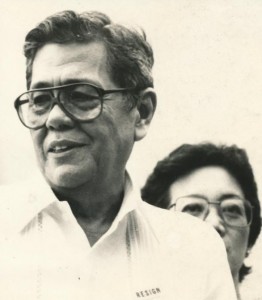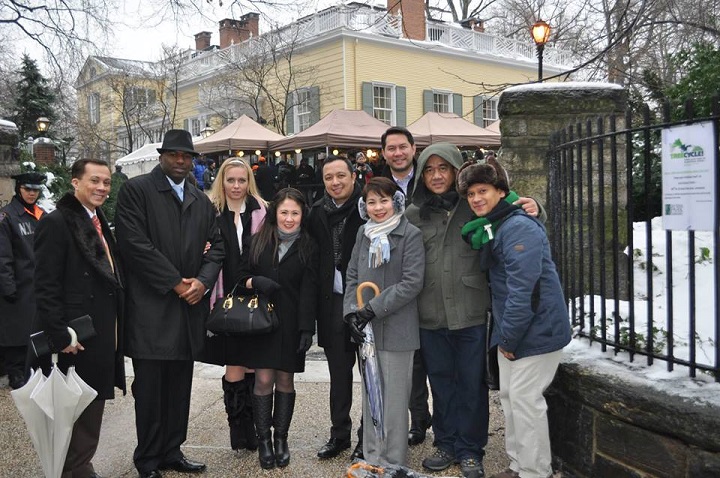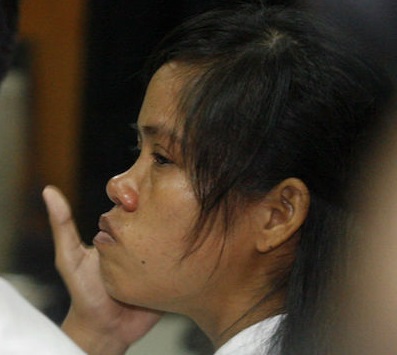The tragedy of Mary Jane Veloso: History repeats itself in a terrible way
Today, April 27, at 6 p.m., Bayan USA is calling on concerned Filipinos in the New York area to join a candlelight vigil outside the Indonesian Consulate on 5 East 68th Street, between 5th and Madison avenues. It would be a matter of hours before Mary Jane Veloso’s execution on April 28. To those who may not be aware of this latest tragedy to happen to Filipino domestic workers, we are publishing an article from Rappler.com, a content partner of The FilAm. The article succinctly examines why, in the aftermath, there will be blood on everyone’s hands, including the “government for not doing enough, and on us for caring too late.”
By Ryan Gajudo Macasero
She sits in her cell alone on the prison island of Nusa Kasambangan in Indonesia, far away from her home and her family in Nueva Ecija, Philippines. But Mary Jane Veloso is not afraid.
In her cell, on execution island, she waits. While she is waiting and hoping to hear that she will be set free, she may also be waiting to hear that she will die. Mary Jane claims to be the victim here – a victim of circumstance and a devious recruiter. She remains steadfast in her innocence – and will continue to do so until the bitter end.
This is the tragic, but all-too-familiar story of Mary Jane Veloso. It is an instance of history repeating itself – and in the most terrible way.
Veloso has been waiting to tell her story for the past five years. But in the next 24 hours, the Filipina accused of drug smuggling in Indonesia – who was sentenced to death by firing squad – could take her last breath staring down the barrels of 12 guns. Veloso, who has been on death row in Indonesia since 2010, said she was set up by her recruiter, Maria Kristina Sergio, in Malaysia. Sergio told her to go to Indonesia for a week, where she was caught with drugs sewn into her bag.
So why only now are we finding Veloso worthy of headline space? Would she have received the same attention if she wasn’t in prison with the Australians and French? Perhaps not. But we know that Veloso’s story is far from new.
In 2013, another Filipina was executed in China for drug smuggling. Until today, we don’t know her name (at her family’s request). And most of us likely don’t care to remember.
And almost 20 years before that, another Filipina by the name of Flor Contemplacion – who is now the most famous Filipina ever executed – was killed in Singapore. A domestic helper in the city state, Contemplacion was accused of murdering a fellow maid and her ward in Singapore. At the time, concerns were raised about the questionable evidence presented in the case and lack of support from the Philippine government. The Ramos administration was accused of waiting too long, not doing enough, and ultimately, letting Contemplacion die.
While much has changed over the past 20 years, one thing remains clear: The Philippines still has yet to learn its lesson.
After April 28, Veloso will be the 8th overseas Filipino executed under the Aquino administration. That’s two more than his predecessor Gloria Macapagal Arroyo. According to Migrante International, there are at least 123 Filipinos sitting on death row in various countries abroad.
So why the alleged P50 million in legal assistance funds for OFWs remains unused, as well as the government’s continued slashing of assistance funds for OFWs since 2010, is incomprehensible.
But our government officials – and even our media – have a spectacular sense of timing, waiting days before a citizen will be executed, to move.
Government’s last-minute responses to OFW executions are becoming predictable templates:
1. A week before execution, send a high-level official to the country where OFW is detained.
2. Look concerned and tell the public that he or she will do their best to free the Filipino, only to say that they did all they could and it’s too late.
3. Offer condolences and financial support to loved ones.
Veloso’s lawyers said they had requested the Philippine government numerous times, over the course of the past five years, to investigate Sergio.
But it was only on April 24 when the Department of Foreign Affairs (DFA) announced that Sergio would be facing charges of illegal recruitment, estafa, and human trafficking.
And by the time they discovered if the recruiter indeed set her up, Mary Jane could already be long gone. What if the courts find that Veloso was, in fact, set up? That she was indeed the victim of a nefarious recruiter?
While avoiding drugs and following the law is a personal responsibility, Veloso’s case highlights a collective failure in Philippine society. As long we are unable to provide good jobs at home, Filipinos will continue to be victims of the scourge of drug and human trafficking.
And Veloso’s blood will then be on everyone’s hands: On the recruiter’s for setting Veloso up, on the government’s for not doing enough, and on us for caring too late.
So this time we must learn our lesson, and we must not forget. To honor Mary Jane Veloso is to ensure that this sad tale of an OFW on death row will be the last.
Ryan Macasero is the BalikBayan editor at Rappler.com. This article is being republished with permission.















